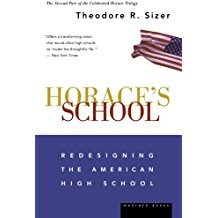
Horace’s Compromise and Horace’s School,
Ted Sizer
1984 and 1992
Read: 2010 or before
Education/Leadership, Non-Fiction
by Ted Sizer (1984 & 1992)
These are books that came out in 1984, as I was beginning my teacher preparation master’s program, and 1992, as I was entering my first principalship. Both of these books have had profound influences on me and my leadership of schools. In short, Ted Sizer gets secondary schools. He understands why it is so wonderful to be in a secondary school, and he understands why it can be so utterly frustrating.
They key to it all is understanding all the demands placed on “Horace”, the fictional high school English teacher. He loves his job, but it is impossible. So, he has to compromise. He understands how complex a high school day/night is for a high school student, and he shows how that student often has to compromise. High schools try to do everything, and staff and students pay the price for that. “School people arrogate to themselves an obligation to all.” (p. 77)
In Horace’s School, Sizer shows a process by which teachers and school officials talk (with “Horace” s the chair of the committee) and talk and eventually get to a place where high school can be fundamentally changed. He shows the factions and problems that will eventually come out in these conversations. Again, his work is very honest. But in this book, he’s also ambitious.
One of the key questions that comes out is, “What do we want students to learn, and how do we know they’ve learned it?” The book goes through several “exhibitions” in which students authentically display their learning/mastery of key concepts. The book also describes the Coalition of Essential Schools, and their nine common principles, paraphrased here:
- Schools should focus on students using their minds well.
- Keep it simple. Each student should master a number of essential skills and demonstrate competence in certain areas of knowledge.
- All students should attain these goals, but they way they get there will vary.
- Teaching and learning should be personalized as much as possible.
- Student as worker, not teacher as deliver of of instructional services. Schools should be places of learning, not places of teaching.
- Remedial work should be provided when students need it.
- School values should include: unanxious expectation, trust and decency.
- Principals and teachers should be generalists first and specialists second. All employees play multiple roles.
- Collective planning for teachers is critical.
I re-read this in 2008, and it rings as true as ever for me. As a principal, I sought many of principles in my school, and had some successes. But again, it takes long term commitment, consistent trusted leadership, and a sense of urgency that the status quo needs to change. Two great books about high school, and even though it’s a little outdated, I still rate it highly.
Leave A Comment